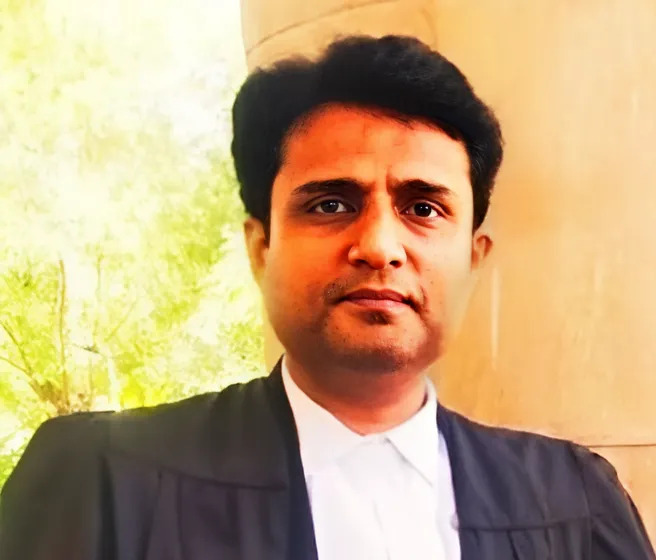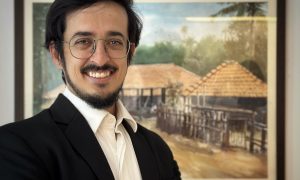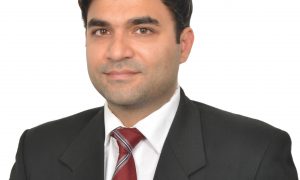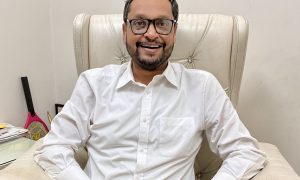This interview has been published by Anshi Mudgal and The SuperLawyer Team

What initially inspired you to choose law as your career path? Was there a particular moment or individual that influenced your decision, and how did your journey begin at National Law Institute University, Bhopal?
I was a student of Science-Mathematics, so initially I wanted to become an engineer. In my 11th standard I came across an edition of India Today which talked about Country’s top advocates. I was deeply impressed by their prowess and authority, most importantly their contribution to the political and legal development of the Nation. It created a subtle effect in my subconscious mind and gradually I started inclining towards the legal profession.
After which I cleared the entrance test of National Law Institute University, Bhopal and joined NLIU. At NLIU I have been exposed to different approaches to legal interpretation for example case based approach to see how the law has evolved over a period of time. It helped me immensely in my future litigation especially in constitutional and Service matter cases.
The initial exposure which I received at NLIU was commendable, for example the lectures delivered by the Supreme Court and High Court Judges and designated Senior lawyers. I am quite grateful to the support which I could gather from my Seniors at law school, for example my Senior Mr. Faizee got me an internship at the chambers of Additional Solicitor General of India, Late Mr. Amrendra Sharan in 2007 and eventually, I joined his chamber only. Moreover through the Clerkship programmes by NLIU at Jabalpur High Court I could observe the minute intricacies of core litigation arguments.
When I joined NLIU, I was not clear about my priorities. But then the lectures of the leading Supreme Court advocates and the Judges created fascination towards the core litigation. But I made sure to have enough exposure to the corporate side , which was probably the dominant idea in NLIU at that time so I did internships in almost all the top law firms in corporate areas. Gradually I became convinced to the core that my inherent interest lies in the Core litigation as in Constitutional and Service matters. Being a first generation advocate, had no guidance in the legal field, had to create my own path.
You were associated with the cases like Bar Council of India Vs A.K. Balaji and Kantaru Rajevaru Vs Indian Young Lawyers’ Association and other landmark judgments by the Supreme Court. How do such cases shape new legal dimensions, and what key insights did you gain from working on them?
Bar Council of India v. AK Balaji underscores the importance of regulating the entry and practice of foreign lawyers in India. The judgment reaffirms the restrictions imposed by the Advocates Act, 1961, on foreign lawyers practicing law in the country. By upholding these regulations, the court aims to preserve the ethical standards and integrity of the legal profession in India while allowing for limited engagement of foreign lawyers in specific legal activities such as providing legal advice on foreign law and participating in international arbitration proceedings. This decision strikes a balance between promoting legal exchange and collaboration while safeguarding the interests of Indian advocates and maintaining the sanctity of the legal system.
Whereas in Sabrimala Case (Indian young lawyers Association versus Union of India), the Supreme Court upheld the concept of constitutional morality, where the judiciary interprets the Constitution in a manner that upholds its core values and principles and went on to clarify that in case of Conflict between Constitutional morality and Social morality, the objective standards of Constitutional morality will prevail.
While working on these case I have realized that these Landmark cases often have a profound impact on society, influencing public policy and societal norms, for example Sabrimala decision allowed the female’s entry into the temple with in age group of 10-50, hence redefined the standards of social morality in accordance with Constitutional morality.
These cases provided me with deep insights into judicial reasoning and the interpretative methods used by judges. In fact these cases provided me with insights which not only enhanced my legal acumen but also contributed to a broader understanding of mine as to how the law interacts with society and evolves over time.
Tell us about your legal journey and mentorship at the Supreme Court of India. How did that experience shape your foundational years, and how have those early lessons influenced your practice today? Could you please walk us through your journey?
After my graduation from NLIU I joined a law firm for a brief period but soon lost interest in law firm culture. I also appeared for Delhi Judicial Services 2010, where I secured 34th rank but was not selected.
Then I joined the chambers of Late Mr. Amrendra Sharan Ji , Additional Solicitor General at Supreme Court of India, at that time. It helped me a lot in terms of exposure, especially on the Govt side. As A juniors at his chamber I assisted him in drafting legal opinions for different government departments, assisted in arguments before the Supreme Court and drafted replies on behalf of the government. I have briefed him on many occasions. Later on when I became the Standing Counsel for the State Govt of Rajasthan, this experience helped me a lot. He passed away on 12th August 2019. He was a person of eminence, mentor and guide to many including myself. He will be remembered for his lucid arguments and his pleasant demeanor at the Court and outside the Court. He may not be with me physically today but his teachings will always be there. His gentle demeanor, his smile, and caring disposition will always be missed.
My second innings of advocacy started with Senior advocate Mr. Mahabir Singh Ji at the Supreme Court. A plainspoken man of substance and humility. I was always amazed at his diversified legal acumen. I have briefed him in my independent matters also. The biggest learning from briefing him is, to hear briefs patiently and carefully. Even though he himself is an authority on legal subject matters, still he would always take briefings very patiently and accommodate the viewpoints of juniors. The teachings learned at his office helped immensely in my future practice at the Supreme Court of India.
After that I started my own independent practice with Mr. Mukesh Kumar singh, who is now the executive member of SCBA. Together we worked upon many landmark reportable judgements pronounced by the Supreme Court like Richal versus Rajasthan Public Service Commission, Employees provident fund organisation versus Sunil Kumar, Kantaru Rajeevaru versus Indian Young Lawyers Association ( Sabrimala case), Satyama Dubey Versus Union of India ( Hathras Rape case ), Saurav Yadav versus State of Uttar Pradesh, related to Vertical and Horizontal reservations in public services etc. to name a few. An overwhelming sense of pride surges within me as I witness Mr. Mukesh Kumar Singh growing in practice and stature in the legal profession as recently for the third time he has been elected as Executive Member of Supreme Court Bar Association. I owe him greatly in terms of establishing my private practice at the Supreme Court of India. Till date we both work as a team.
With your extensive experience in handling tax, constitutional, and service matters, could you share your key roles as Standing Counsel for state and national bodies and highlight some important legal opinions you’ve provided? Also, could you explain some settled principles of service law jurisprudence?
By the grace of Goddess Sh. Karni Ji, I got enough opportunity to defend the state as well as various Corporations and other national bodies.
I have been appointed as Standing Counsel for the Department of Finance (Commercial Taxes). In that capacity I defended cases for the Department of Finance, Govt of Rajasthan. In such Writ petitions, Sales Tax Revisions dealing with GST, VAT, I got them dismissed at the very outset, on preliminary grounds like not exhausting the alternative reliefs available.
Also appointed as Standing Counsel at National Consumer Dispute Redressal Commission at Delhi for Govt of Rajasthan, National Company Law Tribunal and NCLAT Delhi for Govt of Rajasthan, Standing Counsel for Department of Stamp and Registration for Govt Of Rajasthan, Standing Counsel for Rajasthan State Ganganagar Sugar Mill, Rajasthan State Beverage Corporation Limited.
While defending the Corporations I have learned the intricacies of Service Matter Jurisprudence. In such matters successfully defended the corporations from being compelled to regularize the services by persons working for a placement agency. I ensured that we get a categorical order from the Court in such Service matters directing the petitioners to provide an affidavit proving the existence of employer – employee relationship between them and the corporation. This again reinforces the settled legal position that regularization cannot be sought without a clear master- servant relationship.
I have drafted the legal opinions as a Standing Counsel for the finance department, Rajasthan Govt in the matters of Commercial Tax Officer versus M/S Larsen Toubro Ltd., Apollo Pipes Pvt. Limited Vs Tonk Water Supply Limited, Kishna Grit Udhyog Vs State of Rajasthan and Ors. Drafting legal opinions involves high responsibilities as depending upon your opinion, the state will adopt a future Course of action. Hence the legal opinion should always provide clear and concise conclusions and it must answer the legal question posed at the beginning while discussing all the relevant statutes, case laws and legal principles which apply to the issue.
Recently you have been appointed as Senior Public Prosecutor for the National Investigation Agency by the Ministry of Home Affairs, Union Government, this role will be entirely different from core litigation in Constitutional or Service matters, so in that capacity what will be your role and challenges?
My appointment as a special public prosecutor for the National Investigation Agency (NIA) involves handling cases related to national security and terrorism. The NIA is India’s primary counter-terrorism law enforcement agency, and it investigates and prosecutes offenses affecting the sovereignty, security, and integrity of India.
In this capacity, I would be responsible for presenting the NIA’s cases in court, ensuring that the prosecution is robust and that justice is served. This includes preparing legal documents, presenting evidence, and arguing cases in court. This work often involves high-profile and sensitive cases that require a deep understanding of both national and international law.
In the initial years of my practice I always ensured that I gave myself enough exposure at the Session Courts, especially Criminal side. I have argued criminal cases on behalf of the accused especially in POCSO and Session trials. I have also succeeded in keeping a high acquittal rate for my clients in that capacity. But this time as Public Prosecutor at NIA my role will be from the State side and I would play my level best to prosecute the accused, ensuring that justice is served and the accused gets conviction beyond any reasonable doubt.
How do you manage the workload and pressure from these diverse roles and what strategies do you use to maintain a balance between your professional and personal life?
Definitely many a time the litigation becomes hectic and stressful due to high Stakes involved and demanding nature of the profession. With the increase in workload I have deployed a team of junior lawyers and started allocating them specific work. Since I have to maintain my private practice at the Supreme Court so I made myself available at Supreme Court in the matters which required my direct involvement. At the same time I started delegating work at the High Court to my juniors, they helped me a lot. I am thankful to Sudeep Lakhotia, who helped me immensely in Commercial Tax Litigation matters at Jaipur High Court. I trusted my team and delegated tasks that don’t require my direct involvement.
In fact the post COVID phase brought tremendous changes to the core litigation. Now a lawyer sitting at any remote place can attend the litigation at the Supreme Court quite easily. All thanks to COVID and advancements in technology. It has enabled me to manage multiple cases very easily simultaneously, sitting at one place and giving time equally to diverse legal forums.
As an experienced lawyer, do you actively mentor young advocates or law students? What is your approach to mentoring, and what values do you aim to instill in the next generation of legal professionals?
In fact I am an advocate by profession and teacher by passion. I am always very keen on taking lectures over Constitutional Law of India and its evolution over a period of time. Many of my students of Constitutional law and Indian Polity have successfully cleared Civil Services and Judicial Services Examinations. I take immense pride in their Success. I have been associated with Government initiatives for providing free education to the students of Civil Services.
In fact, for the last 15 years of my practice and teaching students, I am learning from my students. Students are the most effective teachers of their teachers. I owe a lot to them for keeping me younger and updated. Every batch of students brings refreshing vibes and intellectually stimulating energies.
I always ensured that my students first develop an interest into the discipline, knowledge and its application will be the by-products automatically. It’s the interest into the discipline which will ensure the application part and will subsequently help them, cracking the questions. Students have always appreciated my teaching methodologies, especially when they have cracked the judicial or civil services and went into the field. They could successfully connect the theory with practice. Without knowing the practical application, theories are meaningless. While teaching the students I always emphasized the importance of integrity, honesty and ethical behavior in all professional activities.
For fresh law graduates aspiring to pursue a career in litigation, what would your advice be—should they start at the district courts or aim for the High Court or Supreme Court early on in their careers. Especially what is your advice for law students from law schools where the dominant idea is always in favor of joining corporate law firms?
It is always advisable to start practice at the District and lower courts where one will learn basic advocacy, nuances of conducting a trial and client handling which eventually help him in the long run in the career as an advocate. In fact for a brief period I was also associated initially with the Session Court where I argued in the POCSO cases and Session trials. After that one can move to the High Court or Supreme Court.
My suggestion to current NLIU students will be to break their comfort Zone which is being provided by corporate law firms in the initial years after their graduation. There will be challenges in the core litigation initially especially for the first generation lawyers but ultimately by investing the initial most productive time you are building your permanent asset as an independent practitioner. In most of the law firms after a certain point the growth becomes stagnated.
In this context it’s also important to identify your inherent interest in the field, I mean it’s highly a subjective question. I personally felt that at NLIU there was always a dominant trend in favor of corporate law firms, even I was perplexed many a time but then ultimately it’s your inherent inclination which is bound to supersede every other consideration. Don’t give too much importance to the monetary considerations initially because these years are the most productive years in which you can construct a business for yourself.
Having been part of many landmark judgments, can you throw some light over your pro bono work in terms of teaching law students or at litigation where such work not only impacted the society but also changed your personal perspective of profession?
I have been part of pro bono work at both the levels as in litigation as well as teaching law students especially the Constitutional Law of India.
At the level of litigation my first Pro Bono case pertained to an employee of Hindustan Salt limited and Samber Salt Limited, ( A Government enterprise ) for revising the payment scale and releasing the arrears and other emoluments.
At the level of teaching I have taken many lectures on Constitutional law of India on a pro bono basis, many of such students have also been successful in Judicial Services as well as Civil services. Nothing can be more satisfactory than enabling the students to understand the intricacies of the complex legal principles. Engaging in pro bono teaching helps law students develop practical skills that are essential for their future careers. They gain exposure to real-world legal issues and learn how to apply theoretical knowledge in practical settings.
Pro bono teaching allows students to explore different areas of law and develop competencies they might not encounter in the classroom. This experience can be invaluable in shaping their career paths.
Get in touch with SHANTANU JUGTAWAT-

























